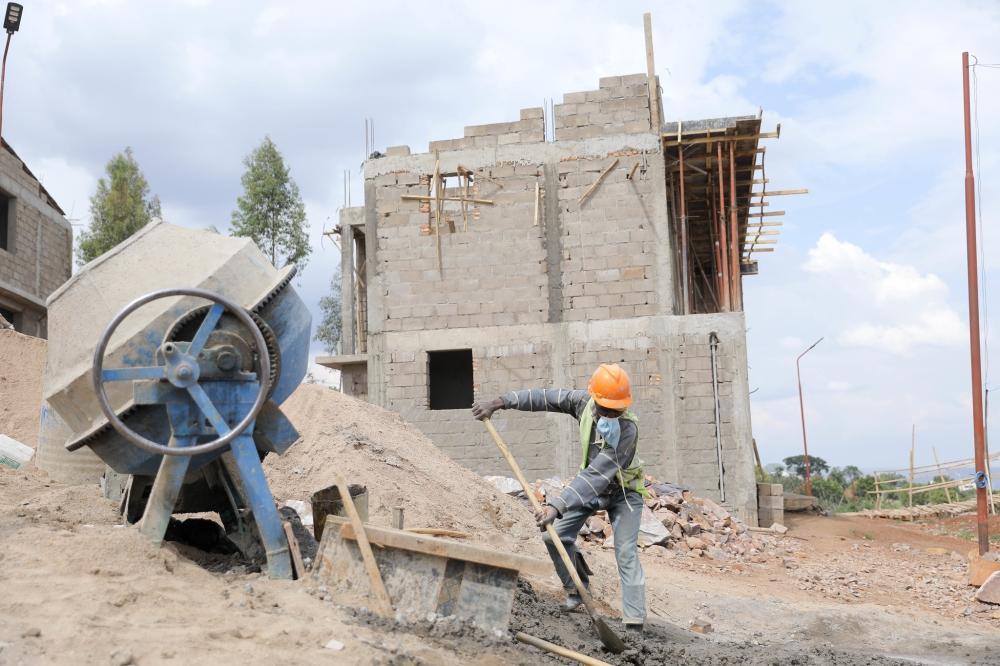Africa-Press – Rwanda. Kigali and other parts of Rwanda continue to experience a surge in construction, but authorities are cautioning builders against mistakes that carry penalties.
The 2019 ministerial order outlines thirteen types of construction violations, each punishable according to the category of the building and the seriousness of the offense.
Philemon Iraguha, Permitting Engineer at Rwanda Housing Authority (RHA), explained that different offences in construction are tied to specific sanctions.
In this article, The New Times looks at the various offences and their penalties:
1. Building without a permit
This happens when construction works begin without a permit, even if zoning rules and land use requirements are followed.
Such offences attract various punishments depending on the size of the building. For example, smaller buildings like residential or commercial houses under 200 square meters, classified as Category two, are suspended and fined Rwf 300,000.
For Category three projects, which cover medium-sized residential and commercial buildings of up to 1,500 square meters and two storeys, the fine rises to Rwf 1,000,000.
Category four, which applies to larger multi-storey buildings and towers, carries a penalty of Rwf 3,000,000, while Category five covering hospitals, schools, industrial facilities, and other buildings hosting more than five hundred people; attracts a sanction of seven million francs.
Iraguha noted that although such buildings may comply with standards, “work is stopped until a proper permit is secured.”
Violating regulations
The situation is more serious if a building project not only lacks a permit but also violates zoning and land-use regulations.
In these cases, demolition is the only option, and the owner bears the full cost.
Renovating without a permit
Renovating an existing structure without approval is treated with equal seriousness. Depending on the category of the building, fines range from Rwf 300,000 for Category two to Rwf 7,000,000 for Category five, with work suspended until proper authorisation is granted.
Skipping mandatory foundation inspection
Authorities also place strong emphasis on the integrity of building foundations. Before construction begins on Category three, four, and five buildings, mandatory foundation inspections must confirm compliance with structural standards.
Failure to secure this inspection results in penalties of Rwf 300,000 for Category three, Rwf 1,000,000 for Category four, and Rwf 2,000,000 for Category five.
“This inspection prevents future risks by ensuring proper positioning, materials, and spacing,” Iraguha explained.
Using a building without an occupancy permit
Even after construction is complete, a building cannot be used until an occupancy permit is issued.
Ignoring this requirement leads to fines of Rwf 500,000 for Category three, Rwf 2,000,000 for Category four, and Rwf 25,00,000 for Category five.
Changing building use without permission
Changing the designated use of a building without official approval is also prohibited.
For smaller structures in Category two, the fine is Rwf 50,000, while for Category three it can rise to Rwf 500,000.
Larger buildings in Categories four and five attract sanctions of Rwf 2,000,000 and Rwf 25,00,000 respectively.
Demolishing without a permit
High-rise and large-capacity facilities cannot be torn down without careful planning and safety approval.
Demolishing a Category four building without authorisation leads to a fine of Rwf 2,000,000, while for Category five, the penalty is Rwf 5,000,000 alongside a requirement to obtain the proper permit.
Building without a certified architect or engineer
For Category three projects, the absence of a certified architect or engineer results in a fine of Rwf 300,000.
In Categories four and five, construction must be supervised by certified companies, and failure to comply leads to a Rwf 5,000,000 fine and immediate suspension.
Working with expired permits
Similar consequences apply to projects that continue after their permits have expired. Fines range from Rwf 50,000 for Category two to Rwf 2.5 million for Category five.
Issuance of illegal permits
If a government institution grants a construction license that contradicts land-use policy, the building is demolished, and the issuing authority is held financially responsible.
“For example, if land allocated for agriculture is wrongly approved for industrial use, the authority that issued the permit is liable,” Iraguha explained.
Unsafe or weak construction
Builders who compromise structural integrity by using substandard materials or ignoring technical requirements are forced to halt work until corrections are made.
If experts determine that faults cannot be corrected, demolition is ordered.
Deviating from approved designs
Deviating from approved architectural designs without securing a modification permit results in fines; Rwf 50,000 in Category two, Rwf 500,000 in Category three, Rwf 2,000,000 in Category four, and Rwf 2.5million in Category five.
For More News And Analysis About Rwanda Follow Africa-Press






